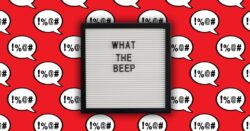Is swearing at work a big deal? (Picture: Getty)
You’ve had a bloody hard day, or bagged a flipping amazing new client. But is it ever okay to swear at work?
The debate has been reignited after an employment tribunal ruled that dropping the f-bomb in the workplace is no longer a big deal.
The judge, Andrew Gumbiti-Zimuto, ruled that phrases such as ‘I don’t give a f**k’ carry a ‘lack of significance’ in this day and age.
‘The words allegedly used in our view are fairly commonplace and do not carry the shock value they might have done in another time,’ he added.
When we asked readers their views, most were pro-swearing on the whole, though most noted that context is key.
Louisa Adjoa Parker, a 50-year-old poet and equality, diversity and inclusion consultant, works freelance from her Somerset home most of the time, meaning she can swear to her heart’s content.
‘I generally don’t when working with others, unless it feels very relaxed,’ she says. ‘However, I really like swearing and people who swear – it enables us to let out anger and frustration.’
Sabina Kadic-Mackenzie, a 38-year-old strategic comms professional based in Edinburgh, points out that there are plenty of ways to tear an enemy (or co-worker) down, without a single expletive.
‘I think I could say something so much worse to a colleague without using a single swear word,’ she says. ‘They’re just words, it’s the intent behind them that matters. In other cultures, children are encourage to swear. We’re perhaps a little too sensitive about it).’
Dave, a 47-year-old who works in north Yokrshire’s fire service, also loves a good swear, but thinks there’s a generational divide concerning what is and isn’t acceptable.
‘Swearing is all part of the “craic,” as is the dark humour, but it’s sad to see that a lot of the youngsters coming into the job are wanting to be offended by literally everything,’ says Dave, who asked not to share his surname.
‘The fire service relies on a team helping each other when back on station following a traumatic job, this is the way of “piss taking”.
‘Soon it won’t be allowed so, in my honest opinion, you will get massive amounts of mental health sickness within the fire service in the future.’
Whether you love swearing or not, what really matters is what your co-workers think – especially those in HR departments.
Choose your audience wisely (Picture: Getty Images)
Michelle Masters, who offers career coaching and is co-founder of Professional Resume Writers, thinks it’s best to err on the side of caution and avoid effing and jeffing around the water cooler the vast majority of the time.
‘I think that because we are taught, from such a young age, that swearing isn’t acceptable, it can be very jarring to experience when in the workplace,’ she tells Metro.co.uk.
‘It can throw some employees off and can confuse dynamics, making them doubt the level of casualness that is allowed. But of course, it depends on the context. ‘
Michelle believes those working with minors, in a client-facing role or in highly professional environments ‘such as government roles, the legal industry, or the medical field’ should have an all-out swearing ban.
More: Lifestyle
‘If the swearing is taking place out of anger or annoyance, especially when directed at workers, then it becomes a toxic environment full of conflict and discomfort,’ she says.
‘If the swearing is taking place as part of casual conversation, without it being aimed in a negative way, then it can actually lead to a positive environment in which employees feel relaxed and at ease, and in which bonding takes place.’
When entering a new workplace, Michelle’s biggest tip is to see what other people are doing and if you’re a seasoned potty mouth who can’t resist, a casual coffee break may be the best testing ground.
But if in doubt, leave it out – you don’t want a tribunal on your hands.
MORE : There’s nothing wrong with swearing at work, our readers say so
MORE : Judge rules the F-word has officially lost its shock value in the workplace
An employment tribunal ruled that swearing has a ‘lack of significance’ these days.





